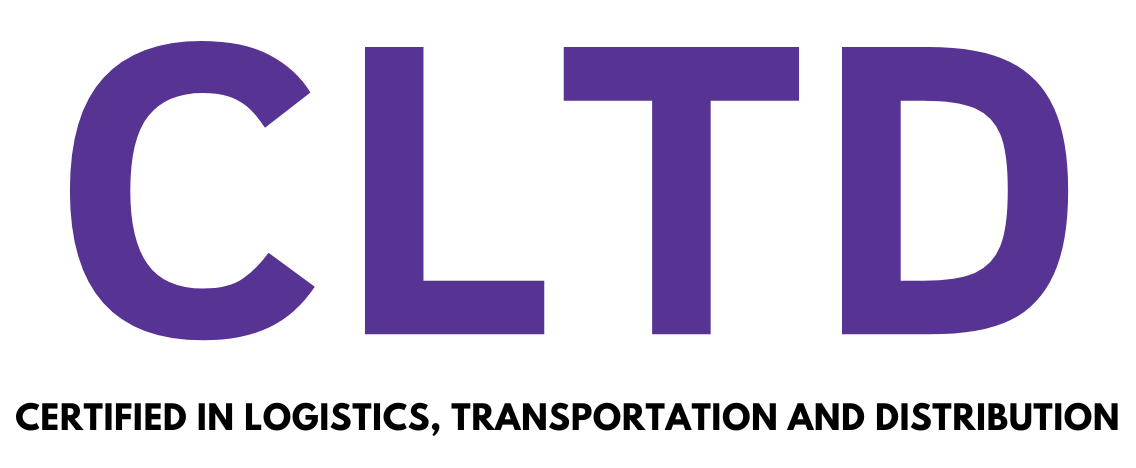Certified in Logistics, Transportation and Distribution (CLTD)
The Certified in Logistics, Transportation, and Distribution (CLTD) credential prepares you to meet current and future supply chain management challenges. The CLTD credential was developed by APICS in collaboration with a group of subject matter experts, it encompasses a comprehensive level of information that sets the international benchmark for best practices in logistics, transportation, and dissemination.
Since 2016, the APICS Certified in Logistics, Transportation, and Distribution (CLTD) credential has been introduced in the Industry. The CLTD program is ideal for aspirational professionals working in the logistics, transportation, and distribution industry or job role, to enhance the logistics function within their organization.
The Certified in Logistics, Transportation, and Distribution (CLTD) credential prepares you to meet today’s supply chain management challenges. The CLTD designation, developed by APICS in collaboration with a group of subject matter experts, encompasses a thorough level of information that sets the international benchmark for best practices in logistics, transportation, and dissemination.
Since 2016, the APICS Certified in Logistics, Transportation, and Distribution (CLTD) designation has been available. The CLTD programme is ideal for aspirational professionals working in logistics, transportation, and distribution who want to enhance the logistics function within their organisation.

APICS- CLTD
APICS CLTD Certification in Logistics, Transportation, and Distribution will provide a complete wealth of research, best industry practices, and standards for those working in logistics, shipping, and distribution companies.
The APICS CLTD certification meets the needs of both professionals and bsuienss owners worldwide by:
- limiting the impacts of skills shortages in the industry
- aiding business owners in constructing the personnel required to meet customer needs and influencing bottom-line results in the organization.
The APICS CLTD Certification system facilitated by KnoWerX, is the most efficient CLTD certification exam preparation system available in the industry. It is segregated into eight components, well spread across four books that represent the entire APICS CLTD Exam Content Manual. These resources and study materials will leverage the ECM’s source reference list citations as well as other relevant logistics reference books.
Benefits of CLTD
The CLTD program facilitates in-depth knowledge of a wide range of topics, distinguishing you from your co-workers and team members, and allowing you to demonstrate a high level of skills – thus becoming irreplaceable! You’ll be a more valuable asset to the organization, allowing you and your company to be more productive in today’s dynamic business environment.
This program will help you develop your expertise in logistics, mass transit, and distribution management. This Certification will distinguish you from your peers and demonstrate your high abilities and expertise to make you categorically indispensable!
Is CLTD the correct option for you?
The CLTD can be a wonderful option if you want to go into the field of logistics and management. CLTD provides individuals with a plethora of skills at their disposal to gain an edge in the market.
The CLTD Learning System is divided into 9 Modules.
CLTD Modules
Module 1: Logistics Overview and Strategy
- Outlining the principles that make logistics useful, including economic drivers
- Understanding how logistics fits within supply chain management
- Managing logistics strategy, including the logistics value proposition
- Developing flexible logistics frameworks and collaborative relationships
- Exploring strategic-level risk management
- Using fundamental performance measurements and benchmarking
- Implementing reengineering and continuous improvement philosophies
Module 2: : Logistics Network Design
- Implementing a logistics network design process
- Considering transportation requirements driving logistics network plans
- Using tools and analyses to select node patterns and links
- Adopting risk management
- Planning for network security and business continuity
Module 3: Sustainability and Reverse Logistics
- Understanding how logistics plays a key role in demonstrating organizational social responsibility
- Managing the triple bottom line, including carbon footprint reductions and green initiatives
- Selecting vendors based on sustainable practices
- Demonstrating responsibility when handling and managing hazardous and dangerous materials
Module 4: Capacity Planning and Demand Management
- Understanding the basics of forecasting including various types of forecasts
- Shaping demand for logistics services
- Translating demand information into planning for transportation and warehousing capacity
- Providing input during S&OP and participating in collaborative planning, forecasting, andreplenishment
- Planning for distribution requirements
- Managing supply, including ERP master scheduling
- Developing a process and selecting a purchasing strategy
Module 5: Order Management
- Performing customer relationship management during order management activities
- Implementing CRM to strengthen relationships
- Meeting customer needs
- Achieving service levels according to customer demand
- Managing the process steps and logistics decision points of inbound, intracompany, and outbound order management
Module 6: Inventory Management
- Understanding inventory management, planning, and control
- Contrasting stakeholder expectations for inventory management
- Summarizing the different functions or purposes inventory serves in a business
- Illustrating the major types of inventory costs
- Differentiating approaches to safety stock and determinations of when to order
- Performing calculations related to standard deviation, economic order quantity, and reorder points
- Describing lean, just-in-time, ABC, vendor-managed inventory and other alternative approaches
- Listing common performance metrics
Module 7: Warehouse Management
- Understanding warehousing strategies and determining which to use.
- Considering physical aspects and tactics related to warehousing design
- Exploring warehousing challenges and trends
- Summarizing warehouse ownership types and functions
- Determining warehouse operations performance measures
- Diving deep into warehouse processes, layouts, materials handling, systems and automation, and packaging
Module 8: Transportation
- Outlining transportation fundamentals including cost structure, stakeholders, capabilities, carrier types, mode classifications, and selection considerations
- Diving deep into the modes of transportation including road, rail, air, water, pipeline,intermodal, and parcel/courier
- Managing transportation according to guiding principles
- Considering tradeoffs when designing transportation networks, selecting carriers and modes, and planning routes and schedules
Module 9: Global Logistics
- Examining current factors in the global logistics space
- Staying competitive while balancing cost and level of service.
- Exploring the history of international trade theories and infrastructure
- Discussing global logistics performance indicators and trade specialists
- Complying with international trade regulations
- Preparing customs documentation
- Discussing finance, payment options, terms of sale, payment methods, currency issues, trade zones, and hedging
APICS CLTD education is essential for ?
- Master the essential domain knowledge needed for the logistics, transportation, and distribution industry.
- Expand your perspective on logistics and distribution management, enabling you to introduce new efficient processes and tools to your organization
- Remain up to date with global logistics trends and developments.
- Boost your confidence and stature with global recognition as a logistics expert.
- Provide you with the tools, to help reduce overall costs and improve customer satisfaction.

Mr. Milind Chandrakant Mandlik, CLTD
I stumbled upon the APICS certification in logistics, transportation and distribution (CLTD) because I needed a program that was fully asynchronous due to my full-time job. Since this was my first foray into online instruction and self learning without attending lectures in physical classroom, I was a bit hesitant.I’m happy to report that I couldn’t have made a better choice! CLTD course is an excellent addition to my qualification.In fact, the courses were so thorough that it has helped me build my knowledge further in international logistics environment, the one area I am passionate about!
The faculty were knowledgeable, approachable, and quite skillful at leveraging the online nature of the program.I can honestly say that APICS program changed my career path completely. I would highly recommend this program to anyone wanting to expand their horizon in logistics.

Ashland India Private Limited
Regional Supply Chain Director - Asia Pacific

Mr. Masahito Kobayashi, CLTD
I passed the CLTD exam successfully through KnoWerX. I sincerely appreciate KnoWerX and my trainer Mr. Sathiyamurthy. They encourage us by informative and productive lecture like supporting APICS learning tool, exam tips and recommending us books or website.
Thank you for your dedication and strong support.

Edwards Lifesciences Limited, Japan

Mr. Anil K Mishra, CLTD
It was amazing experience for preparing CLTD APICS professional certification considering global recognition. Here I would like to thank our instructors Mr. Sathiyamurthy who guided me through out the whole journey and provided valuable input during the course of preparation and examinations. I would also like to thank KnoWerX team and Mandira being patient and professional support even after course completion. Lastly, this would not have been possible without family and friends who always understand and supported.

Pladis
National Logistics Head, India (South Asia)

Mr. Anupam Chakraborty, CLTD
At last, I could crack the CLTD exam. Definitely KnoWerX did also play a very important role too. Initially I didn't have any idea regarding KnoWerX and I must admit here I also enquired from APICS that if KnoWerX is actually their partner or not. When I obtained positive feedback then only I approached KnoWerX. Although there were some initial hiccups, the overall experience has been a pleasant one. I always found them just a phone call away and they were always ready to assist and guide. For APICS certification I will definitely recommend them and maybe if I intend to pursue other APICS certifications I will look forward to getting associated with them again.

Container Corporation of India Limited ( A PSU under Ministry of Railways)
Terminal Manager

Mr. Chandrashekhar Mohan, CLTD
APICS CLTD and other SC related certifications have one theme in common. It taught me the language of the SC Industry. Many of the facts and examples stated may seem very common or obvious but the terms behind them are significant. Another benefit is that once these concepts are well understood and you are confident you can apply to any Industry scenario, you will notice that you can also operate in any given Company management or IT tools used. The essential topics of information remain the same across the board and the terms or jargons used by IT folks will also seem very obvious to you and you would be able to intelligently challenge both business and IT. Personally I can’t speak to CLTD given I am myself working towards my CSCP, but seeing these good signs I felt I have taken the right decision. A Special thanks to Mandira who has motivated me and helps me on time and Special honour to Sathiyamurthy sir, with his 15 mins guidance for the exam I have passed the examination.


Mr. Chintan Raval, CLTD
KnoWerX Institute has helped me achieve my goal of clearing this prestigious certification. The knowledge sharing and teaching method of Mr. Sathiyamurthy is highly commendable and I cannot recommend him enough for the coaching. Even though being from a Finance profession background, KnoWerX has made the learning experience easy and my goal achievable.

Mondiale VGL Pty Ltd, Sydney, Australia
Logistics and Warehouse Professional

Mr. Prashant Jha, CLTD
I was recently certified in APICS – CLTD (02nd January 2022) with “KnoWerX” as basically my partner in this journey. All of my queries were answered timely. Furthermore, they informed me whenever there were some updates on everything from the Courier company that would deliver the materials to me, to the exact date when the materials would arrive at my address. I was well – appraised of the status of my enrollment etc throughout the entire CLTD journey.
I would recommend “KnoWerX” to anyone who wants a hassle – free process for online & self – study services. A special thanks to Mandira Thakur. She has been very helpful throughout my journey.

Indorama Ventures Global Shared Services Pvt. Ltd
SAP Supply Chain Process Consultant

Mr. Sarfraz Khan, CLTD
When I decided to pursue the certification for APICS -CLTD, I reached out to KnoWerX. They were very prompt and helpful in giving all the details and explaining the nuances of the course and very fair in pricing structure for this course. Our trainer Mr Sathiyamurthy was not only a faculty but became my mentor during the course and kept rooting for me and giving the much needed moral booster. Would like to thank KnoWerX and Mr Sathiyamurthy for being there during this journey.``

Hippostores Technology Private Limited
General Manager- Logistics & Fulfilment

Mr. Kiran Khatpe, CLTD
I would like to take this opportunity to thanks KnoWerX team. KnoWerX team has been very helpful in guiding through APICS system and registration.
Team ensured that all important updates are available with me. Special thanks to Mandira, who guided through entire process and was very efficient in clearing the doubts.
Having KnoWerX team to guide was key component to ensuring that I don’t lose track and take my exams in time.

Eaton Technologies Pvt. Ltd
Analyst – Logistics Procurement
FAQs about CLTD Certification
What is APICS CLTD Certification?
APICS CLTD certification is a professional certification offered by the American Production and Inventory Control Society (APICS), now known as ASCM. The Certified in Logistics, Transportation, and Distribution course, is designed to improve the knowledge and skill set of those who manage transportation, logistics, and distributions within an organization. With this certification, professionals will learn the core principles and methods used to effectively manage supply chains in their organization and scale operations even on a global scale. The coursework will cover topics such as procurement, supplier relationships, inventory management, demand planning, order fulfillment, material handling, warehousing, international trade compliance, freight management, channel development, customer service management, and much more. The APICS CLTD certification will provide deep insight into how these topics are interconnected in order to support organizational goals.
What is the CLTD Certification Cost in India?
The CLTD certification cost in India varies depending on several factors such as country, exam fees, study materials chosen, and any additional services. Generally, learners must pay an application fee to register for the CLTD program. Furthermore, learners will also need study material from a partner provider like KnoWerX. Finally, the CLTD exam fee needs to be borne when the learner is ready to attempt the examination. Ultimately, the total cost of enrolling for the CLTD certification in India is variable. To know the exact cost of CLTD, please contact us. There are various bundles and discount offers available with us.
How long does it take to get CLTD Certification?
The CLTD certification is a professional certification offered by ASCM. It is designed for industry professionals who seek comprehensive knowledge of logistics, transportation and distribution.
As with any professional qualification, the amount of time invested to pursue the CLTD certification depends on several factors. Many individuals take 6-12 months to complete their coursework and prepare for the exam. However, depending on your experience in the area of supply chain management, you may be able to move through the process more quickly.
Once you have registered for the exam, ensure to read the content outline as well as study materials. Additionally, special workshops are designed to help candidates achieve better understanding of key concepts in the CLTD Certification exam.
How can CLTD logistics certifications help me in my career?
The Certified in Logistics, Transportation and Distribution – CLTD certification is an indispensable asset to your profile, especially if you are looking to advance your career within the logistics industry. It testifies your expertise in the field of logistics and provides employers with tangible proof of your skills. Having this certification also makes you more competitive when applying for jobs or promotions, as it shows that you have made an effort to stay up-to-date with industry trends and the best practices in the industry.
The CLTD certification is awarded by the Association for Supply Chain Management (ASCM) and requires professionals to take a series of rigorous modules covering topics such as global supply chain management, transportation management, inventory control, warehouse operations management, demand forecasting, materials planning and warehousing.
The CLTD certification is critical for anyone looking to progress their career within the logistics industry. It can also open doors to job opportunities with larger companies where they may offer higher salaries. In addition, having this certification can provide you with additional credibility so that stakeholders will view you in a positive light.
Finally, getting the CLTD certification will give you access to exclusive professional development resources and an extensive professional network offered by ASCM which could help boost your career prospects even further. By participating in educational activities and networking events hosted by ASCM’s network of certified professionals, you can stay abreast of market trends while growing your network in the field of logistics.
In conclusion, the CLTD certification may prove beneficial for those seeking careers within the logistics function due its recognition as the epitome of excellence in the domain of logistics, distribution and transportation.
How can one benefit from ASCM Certification?
Benefits to Companies:
• It helps employees master advanced supply chain management principles that extend beyond an organization’s internal end-to-end operations, from suppliers to customers.
• Provides a higher level of knowledge and skills needed to streamline operations and produce bottom-line results.
Benefits to an Individual:
• Provides candidates with the necessary tools to effectively manage global supply chain activities.
• Enables them to implement best practices to increase supply chain efficiencies.
• Gives more credibility and recognition in your workplace.
Which ASCM certification should I opt for?
- If you are looking for entry Level Certification OR a certification to update your knowledge in the inventory and production field, ASCM CPIM is the best. It covers Plan, Source and Making. Refer to the CPIM brochure to know more.
- If you want to make a career in logistics, plan for ASCM CLTD It covers Delivery and Return within the organization. Refer to the ASCM CLTD brochure to know more.
- If you want to learn about end-to-end operations management, attempt ASCM CSCP It covers the entire spectrum of the supply chain beyond the four walls of the organization.
- If you are looking for best practices, knowledge, skills, and abilities to initiate and enact supply chain transformation. ASCM CTSC includes transformation fundamentals and global logistics, including risk management and sustainability logistics. Refer to the ASCM CTSC brochure to know more.
- When professionals (In the Top or Higher Middle-level management category) have a project to re-engineer or re-structure the supply chain of company, then every participant who is a part of the project should be SCOR-DS Refer to the ASCM SCOR-DS brochure to learn more.
In which industries is the supply chain important?
Today, supply chain exists in almost all fields. The list is quite vast. To name a few…
- Manufacturing companies
- E-Retail
- Technology
- Food and Beverage
- Shipping
- Automotive
- Fashion
- Healthcare
- Oil and gas.
- E-commerce, and so on.
Is the certificate known globally?
Yes, APICS / ASCM Certifications are recognized globally.
Do I have to be an ASCM member to pursue a certificate?
Being an ASCM member, you get discounts on the course components on the ASCM exams, learning system and Bundles.
Should I take training or not?
Training is always beneficial for certifications. You can always connect with the instructor for any doubts or queries related to the study material and have a smooth process towards your exams. KnoWerX instructors have more than 35 years of experience and the passing ratio of KnoWerX candidates is 90%, in their first attempt.
Modes and terms of payments?
- You can make the payment either through Net Banking or Credit Card.
- Payment Terms; I. 100% Advance; II. Installments.
Is it possible to pay fees in EMIs?
Yes, you can. Kindly connect with our sales team for further assistance on the same.
What is exam pattern and Scoring?
Pattern: The Online exam is for 3.5 hours, and a participant needs to attempt 150 multiple-choice questions and no negative marking. The result is prompted within a few seconds of completing the Exam.
Score: The CLTD exam score range is 200-350. A minimum score of 300 or higher is required to pass the examination. Any score of 299 or below is termed as failed or not pass.
Where can I attempt or give the Exam?
- You can take exams across the globe at the Pearson VUE exam and test centers.
- You can search for a convenient location and as per schedule your exam.
What is the validity of all certificates?
APICS/ASCM Certificates are valid for 5 years. Within these 5 years, a candidate must earn and submit 75 points to renew the certificate for another 5 years. For more information on the rules and policies on maintaining certification, please visit https://www.ascm.org/learning-development/certifications- credentials/certification-maintenance.
